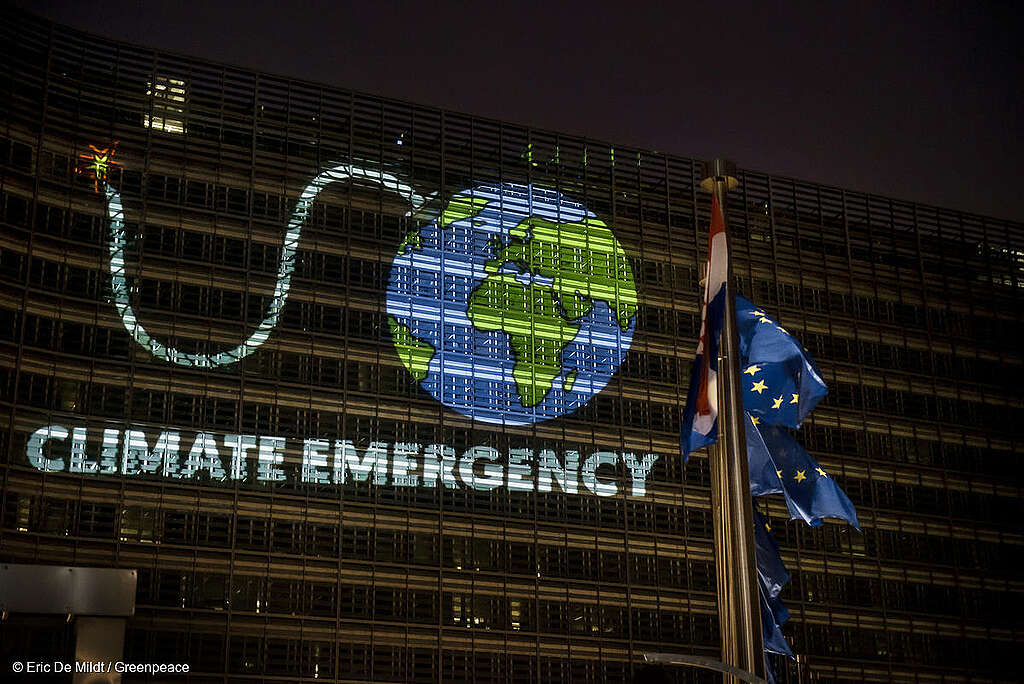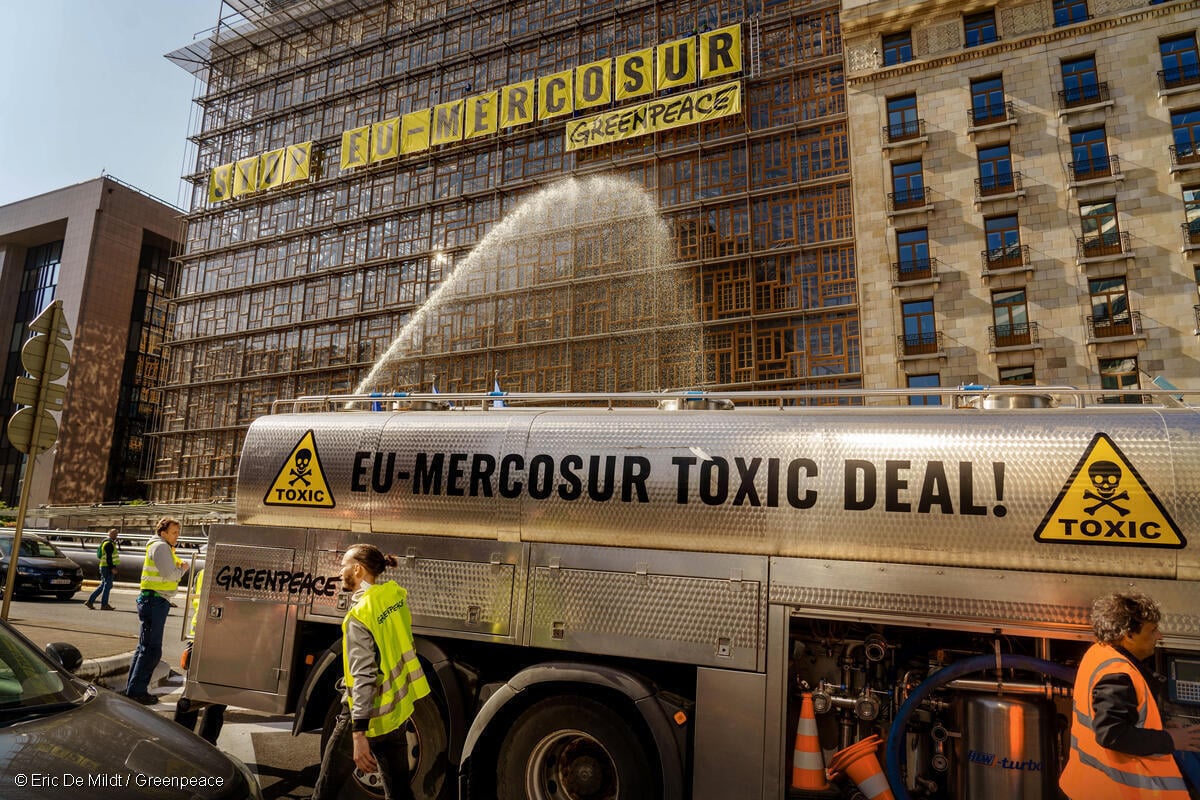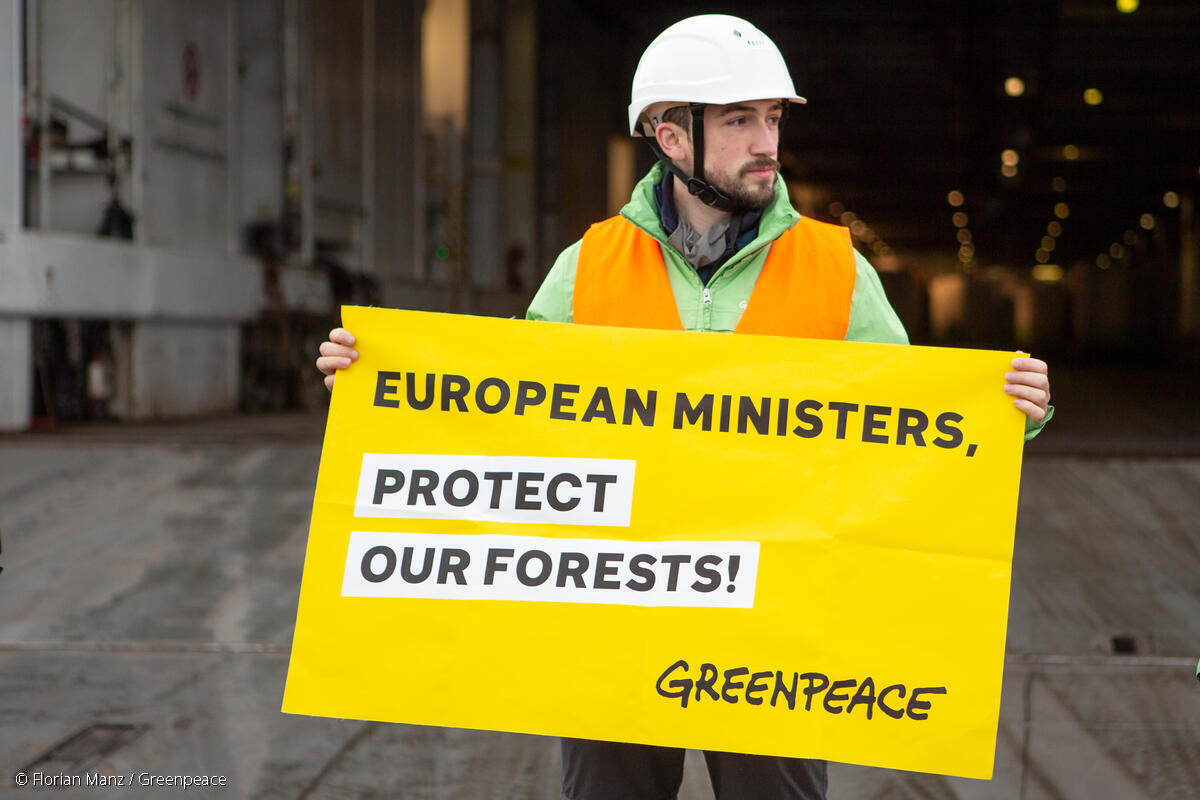Brussels – On 6 February, the European Commission will release an outline of its proposals for EU climate targets for 2040 and for developing carbon capture and storage technology in Europe. Around the same time, the Commission will also establish an ‘industrial alliance’ to steer more investment towards nuclear power.
Leaked drafts of the 2040 climate targets, carbon capture plans and the European Commission’s impact assessment, obtained by Contexte, have revealed some of what the European Commission is likely to announce.
Greenpeace EU climate campaigner Silvia Pastorelli said: “EU countries are some of the world’s biggest historical polluters, have some of the highest per-capita carbon emissions, and have got rich off the back of that. It’s painfully obvious that the EU won’t hit even its own targets without an end to coal, oil and gas – the EU Commission must acknowledge that. Instead it looks like we’ll get a target that’s hiding much lower emissions cuts behind some dodgy accounting based on magic wands to make the pollution disappear.”

Headline target: 90% net emissions cuts
The leaked drafts suggest that the European Commission is set to propose a 90% net cut in the EU’s greenhouse gas emissions by 2040. This is at the lower end of the range that the European Scientific Advisory Board on Climate Change (ESABCC) said was required by 2040 to be on track for the EU’s goal to have net-zero greenhouse gas emissions by 2050. In the EU’s own impact assessment, the scenario envisaging a 90-95% net cut was described as the preferred option, while other options included an 85-90% net cut.
Greenpeace is calling on the EU to reach net-zero emissions by 2040, to make a fair contribution to a global target of net-zero emissions by 2050. The EU, one of the largest historical emitters and with some of the highest per-capita greenhouse gas emissions today, has benefited economically from centuries of burning fossil fuels. Greenpeace argues that Europe has a responsibility to cut its carbon pollution faster than other lower-income countries who have not contributed as much to the climate crisis.
Net cuts versus gross cuts
The emissions reduction target the European Commission will announce will be a net target. This means that it combines actual emissions cuts by substitution or reduction of polluting activities, with attempted capture of pollution at the source and absorption of carbon from the atmosphere to make up for a lower target.
Different possible scenarios are outlined in leaked copies of the European Commission’s impact assessment, but the Commission could be proposing actual emissions cuts as low as 82% of 1990 levels, with carbon capture at the source of pollution and sucking more carbon out of the atmosphere expected to bridge the gap to the 90% net target.
Greenpeace is calling for separate carbon reduction and carbon absorption targets, so that attempts to draw down carbon from the air – a lengthy process with uncertain outcomes – are not used as excuses to keep polluting. The effect of emitting carbon and then removing it from the atmosphere is more detrimental than not emitting it in the first place.
Fossil fuel phase-out missing
The elephant in the room is a full phase-out of fossil fuels. The EU’s Scientific Advisory Board on Climate Change made clear in its recommendations, as part of its report assessing the EU’s progress and gaps on climate action, that a phase out of coal, oil and gas is necessary to reach the EU’s climate goals. So far, there are no EU-wide targets for the phase-out of fossil fuels. The ESABCC also recommends the urgent and full phase out of fossil fuel subsidies in the EU, which the EU had pledged to do almost a decade ago by 2025. Climate commissioner Wopke Hoekstra had also committed to do so during his European Parliament hearing in October 2023.
The leaked copies of the European Commission plans, while mentioning a coal phase out, still foresee a role for fossil fuels as part of “the energy transition”, coupled with carbon capture and storage technology. The leaked documents do not specify the exact volumes, but still explicitly mention the use of oil in transport (road, maritime and aviation) and of fossil gas in industry, buildings and the power sector. Greenpeace is calling for the EU to phase out fossil gas by 2035 at the latest and oil by 2040.
The leaked impact assessment, on the other hand, proposes some specific figures on gas reduction, but they are still not aligned with neither climate neutrality by 2040 nor by 2050. Moreover, from the assessment it is still unclear whether a decrease in fossil gas use would be accompanied by an increase in biogas or biomethane.
Greenpeace and other NGOs have written to the European Commission urging the inclusion of a fossil fuel phase-out in the 2040 climate plans.
Methane
On climate action, time is short, and every delay leads to more global heating. Cutting methane, because it’s so potent in the decades after it’s emitted, and breaks down into carbon dioxide, can actually buy us some time. The level of methane in the atmosphere, and the warming it creates, will immediately start to decrease if current high levels of methane emissions drop.
The largest source of human-made methane emissions is agriculture, mostly from livestock farming, and the second largest is fossil fuel energy. The leaked draft of the European Commission plans suggests that the farming sector’s ‘non-CO2’ greenhouse gas emissions (which are primarily methane) could be cut by 30% by 2040. To significantly cut carbon pollution from agriculture, the EU must plan to reduce the overproduction and overconsumption of meat and dairy, as suggested by the ESABCC.
Fossil gas is primarily composed of methane, meaning that leaks during extraction (particularly via fracking), transport and burning make a large contribution to global heating. Despite this, the EU is planning to import huge amounts of liquified fossil gas, and has listed fossil gas power stations as ‘sustainable’ in the taxonomy of sustainable investments – something the ESABCC flagged as inconsistent with the bloc’s climate goals.
Carbon capture and removals
On 6 February, the European Commission is also releasing a ‘carbon management’ plan, which outlines proposals to develop technology to capture carbon emissions at the point of pollution – carbon capture and storage, CCS – and plans to remove carbon from the atmosphere.
Both this carbon management strategy and the impact assessment report indicate that the Commission is placing a high bet on carbon capture and storage, particularly in sectors that are harder to decarbonise. The impact assessment’s scenario for 90-95% net emissions cuts relies heavily on carbon capture and storage: 240 megatons of CO2 each year (up from the current target of 50 megatons a year by 2030). At the moment, there are no industrial-scale carbon capture projects operational in the EU.
Greenpeace strongly opposes the Commission’s proposal to deploy carbon capture in the power sector for energy production. The power sector has already abandoned the idea of using carbon capture, as other ways to decarbonise are both cheaper and easier to deploy. The recent report by the European Scientific Advisory Board stresses that policies supporting carbon capture should be targeted only towards those sectors where mitigation options don’t exist or are very limited (like steel, cement, chemistry, etc.), and specifically never for the power sector.
Protecting nature, and restoring degraded nature, is vital for tackling the twin crisis of biodiversity loss and climate breakdown. But banking on nature restoration to soak up carbon and allow pollution elsewhere is counting chickens before they’re hatched. Greenpeace warns that European Commission targets for restoration and carbon sinks must not be an excuse to not cut emissions and prolong the life of fossil industries and fossil energy sources. Greenpeace calls on the European Commission to stop allocating funding for research and innovation via the Horizon Europe fund to carbon capture and storage, or carbon removal technologies.
Nuclear
The European Commission is also expected to launch an ‘industrial alliance’ for small modular nuclear reactors, aiming to accelerate their deployment in the early 2030s, and claiming this will help the EU reach its 2040 climate target.
Research shows that this technology is nowhere near ready, bears the same safety and environmental risks as the current nuclear technology and is facing huge financial challenges. The most advanced small modular reactor project, NuScale in the United States, has been canceled because of the costs involved. Greenpeace warns that investment in this technology risks diverting money away from the rollout of solutions already proven to cut fossil fuel use, such as public transport, home insulation and renewable energy.
The European Scientific Advisory Board on Climate Change says they don’t see nuclear as a solution to reach the EU’s 2030 climate goals, as it’s too slow and too expensive, and highlight the vulnerability of nuclear power to the changing climate, particularly due to more frequent and extreme droughts.
Europe’s most recent nuclear plant, Olkiluoto 3 in Finland, took 18 years to build and cost €11 billion. France’s Flamanville 3 has been under construction for 16 years and is expected to cost over €19 billion in total, six times the initial price estimate. The UK’s Hinkley Point C, which has been under construction since 2016, could be delayed to 2031 and cost up to €41 billion.
Next steps
The European Commission is presenting these announcements as first steps towards developing a package of climate and energy policies when the next European Commission takes over after the European Parliament elections.
On 12 March, the European Commission will also announce its plan to deal with climate risk, resilience and adaptation.
Members of the European Parliament will debate the Commission’s 2040 climate plan on 6 February. Climate and environment ministers are expected to discuss the plans when they meet on 25 March.
Contacts:
Silvia Pastorelli, Greenpeace EU climate and energy campaigner: +32 496 12 20 94, [email protected]
Greenpeace EU press desk: +32 (0)2 274 1911, [email protected]
For breaking news and comment on EU affairs: www.twitter.com/GreenpeaceEU
Greenpeace is an independent global campaigning network that acts to change attitudes and behaviour, to protect and conserve the environment and to promote peace. We do not accept donations from governments, the EU, businesses or political parties. Greenpeace has over three million supporters, and 26 independent national and regional organisations with offices in more than 55 countries.
EU Transparency Register: 9832909575-41



